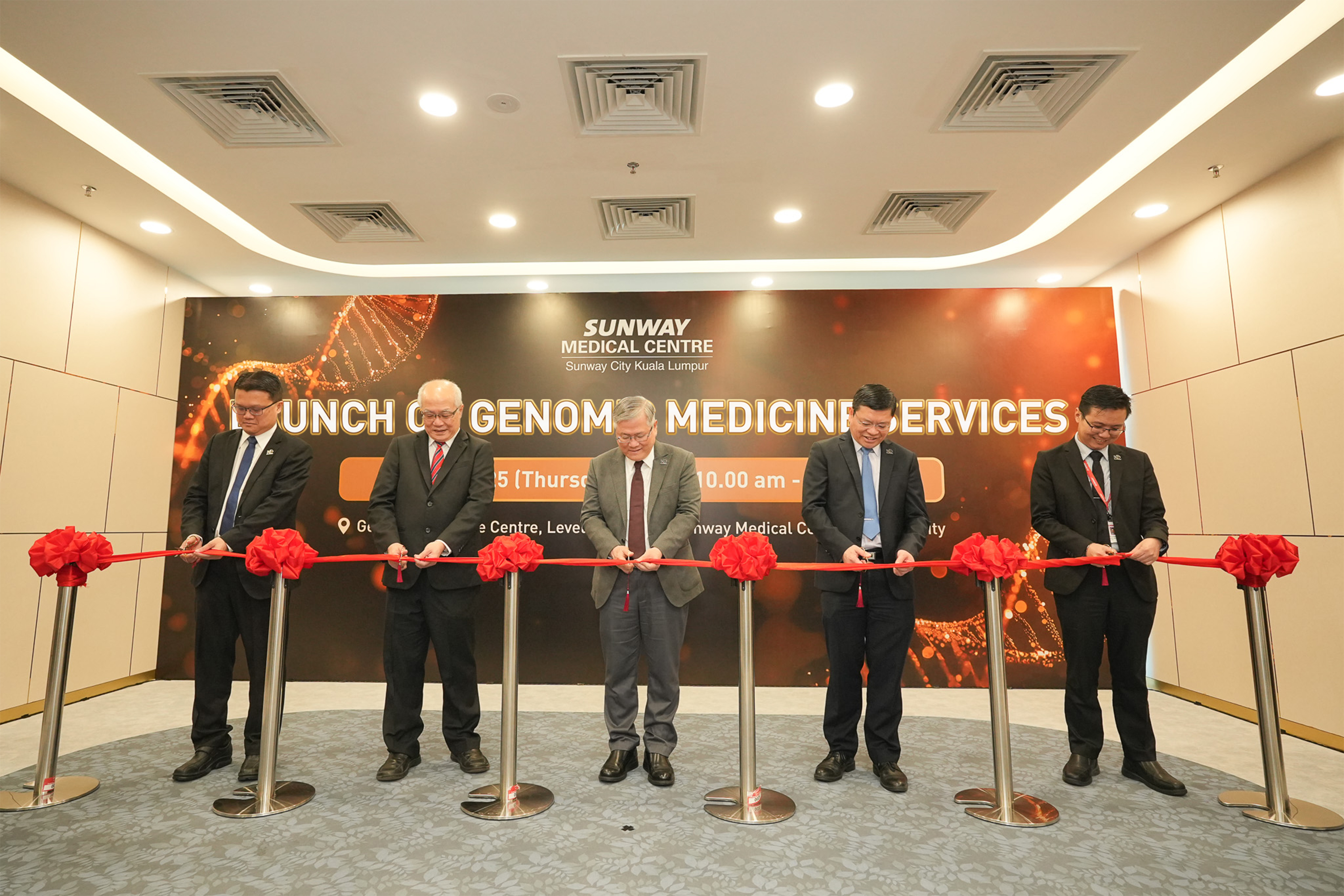With Genomic Medicine, Sunway Aims To End Confusing, Expensive Diagnostics
19 June 2025

Sunway Medical Centre, Sunway City (SMC) has launched their new Genomic Medicine Services, offering a range of clinical genetic testing options aimed at improving early diagnosis, personalised treatment and preventive care.
The genomic services, located in the hospital’s newly opened second Health Screening Department, include whole exome sequencing, whole genome sequencing, carrier screening for couples, hereditary cancer risk panels, liquid biopsy for cancer detection, rare disease diagnostics, and newborn screening for inherited metabolic disorders.
The launch comes as Malaysia faces growing demand for personalised medicine, especially with rising rates of non-communicable diseases (NCDs) and undiagnosed rare conditions.
According to the National Health and Morbidity Survey (NHMS) 2023, nearly one in six Malaysian adults (15.6 per cent) have diabetes, while nearly one-third (29.2 per cent) are living with hypertension. Many rare diseases remain underdiagnosed due to limited access to genomic testing.
“Genomic medicine is one of the most rapidly developing fields in medicine,” said Dr Khoo Chow Huat, managing director of hospital and health care operations at Sunway Healthcare Group, at the June 12 launch.
“At Sunway Medical Centre, patients will have access to a comprehensive range of genomic testing services. These services are seamlessly integrated with our multidisciplinary care model, ensuring that genomic insights are not only generated, but translated into actionable steps for patient management.”
Cancer Screening, Rare Disease Diagnosis, Paediatric Genetic Testing
One of the immediate applications is in oncology, where early detection remains a major gap in Malaysia.
“We are introducing liquid biopsy tests, which offer early detection of cancers, enabling timely intervention and improving patient outcomes,” Dr Khoo said. “We also offer hereditary cancer testing, which can help individuals understand their inherited risks and allow clinicians to design personalised, risk-based screening strategies.”
These include enhanced surveillance, preventive medications, or risk-reducing surgeries, Dr Khoo added, citing Hollywood actress Angelina Jolie, who underwent preventive surgery after learning she carried a BRCA mutation.
The hospital is also targeting paediatric patients with rare or complex conditions. Dr Ch’ng Tong Wooi, paediatric endocrinologist at SMC, said many children with unexplained severe obesity may benefit from genetic testing.
“If you have a patient who develops severe obesity under five years old, that is an indication for genetic testing. For example, if we find Prader-Willi Syndrome, we can tailor treatment using growth hormone and newer therapies like disoxycholic acid,” she said.

Dr Ch’ng said whole genome or whole exome sequencing allows identification of mutations causing rare diseases, enabling earlier diagnosis and targeted intervention. The hospital offers disease panels for specific conditions and targeted sequencing based on clinical presentation.
Prof Dr Thong Meow Keong, visiting consultant clinical geneticist at SMC, said genomic testing can significantly shorten the diagnostic process for identifying rare or complex endocrine disorders.
“Genomic testing looks directly at a person’s genes to find the exact cause of an endocrine disorder, like hormone problems or gland diseases. Instead of doing many separate tests to guess what’s wrong, genomic testing can check for hundreds of possible causes at once. This saves time and gives doctors clear answers faster,” Dr Thong explained.
He added that many rare diseases are often misdiagnosed due to overlapping symptoms with common illnesses or limited familiarity among doctors. “Genomic testing helps by finding the hidden genetic cause, even when symptoms are confusing or mixed. This helps avoid trial-and-error treatments,” he said.
Citing real-life cases, Dr Thong noted that there are many cases worldwide where children with unexplained developmental delays or hormone problems were finally diagnosed through genomic testing.
“For example, some children with unexplained growth issues were found to have specific genetic syndromes only after genetic testing, giving families clear answers after years of searching. In Malaysia, more families are starting to get these answers through government and university hospitals,” he said.
Newborn Screening For Inborn Errors Of Metabolism
SMC’s Genomic Medicine Services is also introducing newborn screening for inborn errors of metabolism (IEM), a group of genetic disorders affecting metabolic processes.
“In Malaysia, about 150 babies out of 500,000 are affected by IEM each year,” Dr Ch’ng said.
“Newborn screening is already compulsory in several countries, especially in the United States, United Kingdom, Australia, Singapore, Taiwan, Japan, South Korea, and UAE. What we are trying to do is introduce this in Malaysia.”
The screening involves collecting a few drops of blood from the newborn’s heel within the first few days of life, enabling early intervention and prevention of severe complications.
Carrier And Prenatal Screening For Couples
SMC’s genomic services also extend to couples planning pregnancy, offering carrier screening for recessive genetic conditions.
“For a couple that wants to have a baby, they can come to our centre and then try to do this screening by looking at any carrier disease. So we try to identify whether the patient or the couple has any specific or any genetic condition that could affect the baby.
“We personalise the risk assessment, helping the families to understand the risk and make an informed decision to have a baby for their pregnancy,” Dr Ch’ng explained.
“For this prenatal genetic counselling, what we do is that we look at the patient’s genetic profile to see if there’s any carrier in a person. A genetic carrier is a person that has mutant gene or recessive disease who usually do not display any symptoms at all, for example, like thalassemia trait and stuff like that—they don’t present with any symptoms. Although carriers are very healthy, they are able to pass the disease to the offspring.
“If you look at the diagram, you’ll see that if a carrier father and a carrier mother for autosomal recessive inheritance, there’s a 25 per cent chance that the baby might have the condition.
“For X-linked recessive inheritance, if a mother is a carrier of the disorder, there is a 25 per cent chance that she will have an affected son in each pregnancy.
“In summary, genomic medicine addresses the root cause by understanding how genetic mutations actually influence health, and IEM newborn screening, followed by treatment, actually helps improve the outcomes and help the baby live a healthy life,” Dr Ch’ng said.
In addition to couples, the service is also applicable for individuals with a family history of genetic disorders who wish to clarify their own carrier status prior to starting a family.
Reducing Unnecessary Medical Tests, Emotional Burden
Dr Edward Eu Chee Yang, senior manager of genomics medicine at SMC, pointed out that early and accurate genomic diagnosis can help avoid unnecessary medical tests and treatments.
“When doctors know exactly what’s causing a disease early, they don’t need to keep running multiple scans, blood tests, or trying different treatments that may not work. This saves time, money, and avoids putting the child through unnecessary medical procedures,” Dr Eu said.

Beyond clinical benefits, Dr Eu highlighted the emotional toll faced by families during prolonged diagnostic journeys.
“Families often feel stressed, frustrated, and even guilty when they can’t get clear answers about their child’s health. It can also affect family relationships. Getting a diagnosis through genomic testing gives families clarity, reduces anxiety, and helps them plan for care, treatment, and support. It brings emotional relief, even if the disease doesn’t have a cure,” he said.
Dr Eu also emphasised the role of advocacy and awareness in promoting genomic medicine.
“Patient advocacy groups help raise awareness about rare diseases and the importance of genomic testing. They connect families with doctors, support services, and financial aid programmes,” he said.
“In Malaysia, these groups are also working with the government to push for better access to testing and early diagnosis programs. Awareness campaigns help reduce stigma and educate the public and health care workers about rare diseases.”
A Step Towards Broader Genomic Integration
“As science develops, more tests and services will become available, more conditions can be diagnosed early, and more precision interventions can be delivered,” said Dr Khoo.
“As technology improves, we also will be able to bring down the cost of testing, making these services more accessible to more people.
“The future of health care is one that will be increasingly personalised to each patient’s needs at risk, rather than one size fits all.”
Genomic Medicine Services at SMC are now open to the public and can be accessed via physician referral or self-enquiry, including virtual consultations.
Source: CodeBlue
后退






